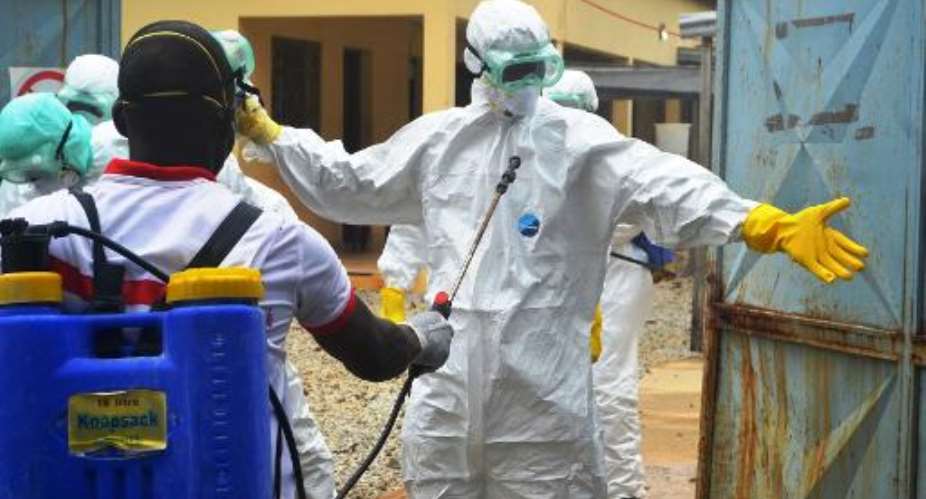Washington (AFP) - The World Bank warned Wednesday that fear of the deadly Ebola virus is choking off economic activity in West Africa with potentially "catastrophic" results.
The "fear factor" is spurring even people unaffected by the disease to pull back on their work activities -- in farming, mining, manufacturing or other areas -- so that they are producing less, earning less and spending less.
That is exacerbating the already heavy burden Ebola is exacting on the finances and health systems of the three hardest-hit countries.
"If the virus continues to surge in the three worst-affected countries -- Guinea, Liberia, and Sierra Leone -- its economic impact could grow eight-fold, dealing a potentially catastrophic blow to the already fragile states," the World Bank said.
In the bank's worst-case analysis, with only slow containment of the disease, economic growth in Liberia next year could fall by 11.7 percentage points, plunging the country deep into recession with a 4.9 percent contraction.
In Sierra Leone, the worst-case impact could be 8.9 percentage points lost from growth in 2015, and in Guinea, 2.3 points.
The World Bank, however, said that the mobilization in recent days of more resources to fight the disease, which has left more than 2,400 people dead, could mitigate much of the economic damage.
"The primary cost of this tragic outbreak is in human lives and suffering, which has already been terribly difficult to bear," said World Bank President Jim Yong Kim.
"But our findings make clear that the sooner we get an adequate containment response and decrease the level of fear and uncertainty, the faster we can blunt Ebola's economic impact."
The clear slowdown in economic output due to the disease is hitting government finances in countries already dependent on support from the World Bank, the International Monetary Fund and others for fiscal stability.
A key issue, the World Bank said, is containing the spread of fear of the disease, which has spurred people and companies to cut back economic activities.
The reticence or inability of people, even those not directly affected by the disease, to continue in their jobs, is feeding higher prices, falling incomes and greater poverty.
In Liberia, the worst-hit country, the economy was growing solidly ahead of the Ebola outbreak.
Since then the key mining sector, responsible for 17 percent of economic output, has slowed sharply, in part because of restrictions on the movements of people.
In agriculture, the evacuation of management personnel by palm oil giant Sime Darby has slowed plantation planting efforts, and the company put on hold the construction of an oil palm mill.
In quarantined areas farms have been abandoned, and in others labor shortages have hit harvesting and planting of crops including the key staple rice.
In manufacturing the fall in consumption of everything from cement to beer has hurt production.
Similar impacts can be seen in the other two countries, though not enough to drive them into recession.
In August the World Bank pledged $200 million to help the three countries fight Ebola.
And on Tuesday, the United States said it would seek to boost to around $760 million the funds it is making available to fight Ebola, and would deploy 3,000 US military personnel to West Africa to help combat the crisis.





 Tuesday’s downpour destroys ceiling of Circuit Court '8' in Accra
Tuesday’s downpour destroys ceiling of Circuit Court '8' in Accra
 SOEs shouldn't compromise on ethical standards, accountability – Akufo-Addo
SOEs shouldn't compromise on ethical standards, accountability – Akufo-Addo
 Father of 2-year-old boy attacked by dog appeals for financial support
Father of 2-year-old boy attacked by dog appeals for financial support
 Jubilee House National Security Operative allegedly swindles businessman over sa...
Jubilee House National Security Operative allegedly swindles businessman over sa...
 Nobody can order dumsor timetable except Energy Minister – Osafo-Maafo
Nobody can order dumsor timetable except Energy Minister – Osafo-Maafo
 Mahama wishes National Chief Imam as he clock 105 years today
Mahama wishes National Chief Imam as he clock 105 years today
 J.B.Danquah Adu’s murder trial: Case adjourned to April 29
J.B.Danquah Adu’s murder trial: Case adjourned to April 29
 High Court issues arrest warrant for former MASLOC Boss
High Court issues arrest warrant for former MASLOC Boss
 Align academic curriculum with industry needs — Stanbic Bank Ghana CEO advocates
Align academic curriculum with industry needs — Stanbic Bank Ghana CEO advocates
 Election 2024: We'll declare the results and let Ghanaians know we've won - Manh...
Election 2024: We'll declare the results and let Ghanaians know we've won - Manh...
